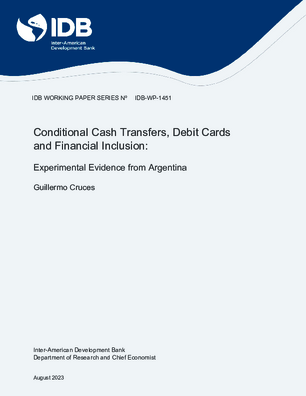Conditional Cash Transfers, Debit Cards and Financial Inclusion: Experimental Evidence from Argentina
Date
Aug 2023
Cash transfer and other social protection programs in developing countries have often been accompanied by measures to foster financial inclusion, such as the adoption and use of bank accounts and electronic means of payments. Argentina's social benefits are paid in bank accounts and accessed through debit cards. With the simultaneous objective of fostering formality among beneficiaries and stores, the use of debit cards for purchases has been incentivized by means of additional subsidies. We studied the low take-up of these extra benefits by means of a field experiment involving 400,000 beneficiaries of Argentinas largest conditional cash-transfer program (with 2.2 million beneficiaries who are the parents of four million children, 40% of the countrys 0-17-year olds). By using their debit card to spend the allowance, rather than withdrawing cash from ATMs, they can receive a rebate of 15% of their expenditures. However, they systematically fail to claim this benefit: only about 25% of beneficiaries receive this transfer. Our experiment provided information about the effectiveness of an information campaign conducted via text messages or through on-screen messages at ATM machines. The campaign increased purchases with debit cards and subsequent rebates significantly but not substantially in the short run. However, beneficiaries who increased their use of debit cards do not exhibit a higher probability of having access to credit through the financial system, nor higher levels of formal employment. The results indicate that cultural factors (a preference for cash), administrative hassle and citizen security issues are relevant issues that limit the potential of financial inclusion through increased use of digital means of payment.




